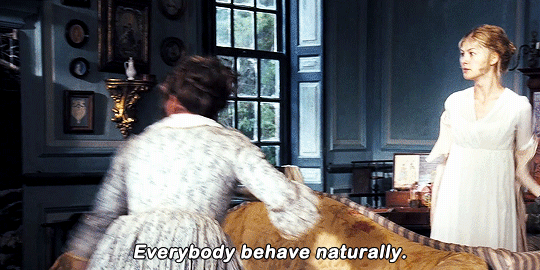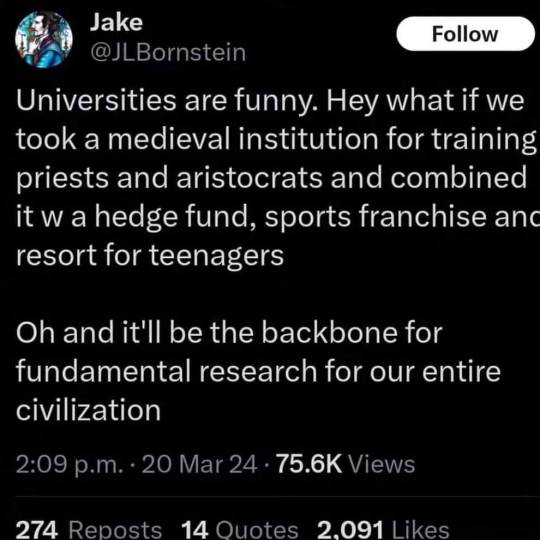Text
I love how whenever ATLA recognizes Sokka is smart enough to solve a problem but it’d be too fast they just stick him in some kind of situation. Like he COULD’VE stopped jet from drowning a town so they tied him up and dumped him in a forest. He COULD’VE figured out what that spirits deal was so they lost him in the spirit world for 24 hours.
3K notes
·
View notes
Text
I can’t stop thinking about this quote, from The Atlantic’s article about Mr. Rogers and his legacy:

That last bit, “we all long to know that there’s a graciousness at the heart of creation” has been stuck with me all day. Partly because there are echoes of the Catholic I used to be in its phrasing—the idea that we are all hungering for grace is embedded in my very skull; I don’t think it’s ever washing out. But there’s something about graciousness in particular…
These days, I take a bus to work. Once, long ago (i.e., 2012) a coworker described public transportation as an exercise in mutual tolerance—a group of perfectly unaffiliated strangers come together in a crowded, constrained environment with the understanding that this will be mutually painless only insofar as we make it painless for each other. This means: you don’t talk loudly on your cellphone. You listen to music with earphones. You pretend not to be reading what your immediate neighbor is texting her friends. You squeeze yourself into as small a space as you can and say liberally “sorry” and “excuse me.”
And still…..there are older people on my route, and pregnant women, and a couple folks with the big motorized wheelchairs. And every time, I’m still surprised—touched, even, by the people who very gently brush an older woman’s elbow and ask “Would you…?” and when she nods, gather their things and stand. The nervy-looking young man who rockets to his feet to offer the pregnant woman somewhere to sit. CTA buses are somewhat-to-mostly ADA accessible, but only if the people sitting in the designated seats get up and lift the plastic, ugly-colored pew they were sitting on to make room. I’ve never heard the bus driver do more than start to lower the access ramp; the people in those seats nod, gather up purses and laptop bags and coffee cups and make their way to a convenient hanging strap.
It’s not anything profound, it’s not special. This should be the way the world works on every level, the ordinary and rote grind of mindfulness of how others move through the world—even perfect strangers, stuck in traffic on Lakeshore Drive. I think often graciousness is a habit, a rote lesson learned and reiterated and made ordinary by its consistent application. Saying “thank you” is gracious even if it isn’t meant, small talk with coworkers is gracious even without any sort of real or genuine connection. Graciousness, the unthinking social response to need, to difference, to the other people you occupy the world with, and all others who you don’t personally know, can be deeply and movingly virtuous by virtue of its existence. Still mundane, absolutely, but….making it a part of our ordinary reality gestures to an even better one, where the good and the gracious are even more boring and commonplace.
For contrast: there are a number of times I’ve run to catch a bus (or watched someone else run for the bus while I’m on it) and every time the bus driver waits for you feels like an unearned gift. The bus driver is not obligated—they have a proscribed route and a certain timeline for fulfilling it, they are under no obligation to wait for panting, half-running person wind-milling her arms in an attempt to stall. But for me, the difference between grace and graciousness is that exactly. We all want to believe that at the heart of creation is an elevated kindness, a true and earnest desire to help; I believe that. And there’s certainly evidence of it in graciousness—last week when a man slipped in the slush of Michigan Ave and strangers rushed to help him up; a woman hanging off a pole lost her grip as the bus stopped suddenly, and another woman was already reaching out to steady her. But there’s also those situations you can’t write off as habit or instinct—sometimes there’s a choice, and you can either keep going and serving your self and your agenda, or you can stop, and let someone skip-run across the intersection and catch their bus.
6K notes
·
View notes
Text
#touch typing is significantly faster than phone#i can touch type on a tablet so i consider that to be about the same#touch pads are more error prone though
3K notes
·
View notes
Text
I saw a post about tumblr user ages...
Reblogs are welcomed for that sweet, sweet increased data pool (aka getting more than 20 responses 😅)
9K notes
·
View notes
Text
obsessed with how different the first boxcar children book is from the rest of the series. like i haven't read any of them in ages but iirc it was like
boxcar children book 1: they are living in a boxcar
boxcar children books 2-160: they are solving mysteries
746 notes
·
View notes
Text
“Mere statistics can hardly do justice to the Benedictine achievement, but by the beginning of the fourteenth century, the order had supplied the Church with 24 popes, 200 cardinals, 7,000 archbishops, 15,000 bishops, and 1,500 canonized saints. At its height, the Benedictine order could boast 37,000 monasteries. And it was not merely their influence within the Church to which the statistics point; so exalted had the monastic ideal become throughout society that by the fourteenth century the order had already enrolled some twenty emperors, ten empresses, forty-seven kings, and fifty queens.1 Thus a great many of Europe's most powerful would come to pursue the humble life and spiritual regimen of the Benedictine order. Even the various barbarian groups were attracted to the monastic life, and such figures as Carloman of the Franks and Rochis of the Lombards eventually pursued it themselves.2”
- Thomas E. Woods Jr., Ph.D., “How the Monks Saved Civilization,” How the Catholic Church Built Western Civilization
—
1. G. Cyprian Alston, "The Benedictine Order," Catholic Encyclopedia, 2nd ed., 1913.
2. Alexander Clarence Flick, The Rise of the Medieval Church (New York: Burt Franklin, 1909), 216.
45 notes
·
View notes
Text
The concept of not using your top sheet is totally foreign to me. I guess it’s because I grew up in a drafty old house sleeping under down comforters, antique quilts, wool blankets and other pieces of bedding that were a sensory nightmare/difficult to clean. I see people in my generation joke about the uselessness of the top sheet and I’m like. Idk, I think it has a pretty important job to do protecting you from touching the creepy haunted quilt your great grandma sewed.
9K notes
·
View notes
Text

But pro-aborts will see this and immediately try to justify it and come up with some reason why those arguments are good when they use them.
Just goes to show that the arguments to dehumanize, abuse or kill a whole group of people never change.
724 notes
·
View notes
Text
Shawn and Gus are drift compatible but under no circumstances should they ever be allowed to pilot a jaeger
7K notes
·
View notes
Text
My coworker Mike just started cracking up. Informed us someone was trying to make a test Outlook group at work and seems to have accidentally made it a real Outlook group.
Everyone added to the group is named Mike.
Creator of the group isn’t online yet but the Mikes are coming online in droves.
12K notes
·
View notes
Text
If you say "religion and science are contradictory" I don't trust your opinion on either
291 notes
·
View notes
Text
I’m just curious and trying to figure something out so please vote and reblog if you can ☺️
117 notes
·
View notes
Text
I designed a new flag for Barntopia, because it’s the truth:

15K notes
·
View notes
Text
dropped the walrus vs fairy question on a group of psychologists today and not only did the majority agree the walrus would be more surprising, the one with the strongest background in research responded to the ‘but fairies aren’t real’ argument with “are your beliefs so inflexible that you’ve never considered you might be wrong about what’s real and what’s not?” and honestly i haven’t recovered
39K notes
·
View notes
Text
ok I’m trying to see something here
16K notes
·
View notes


